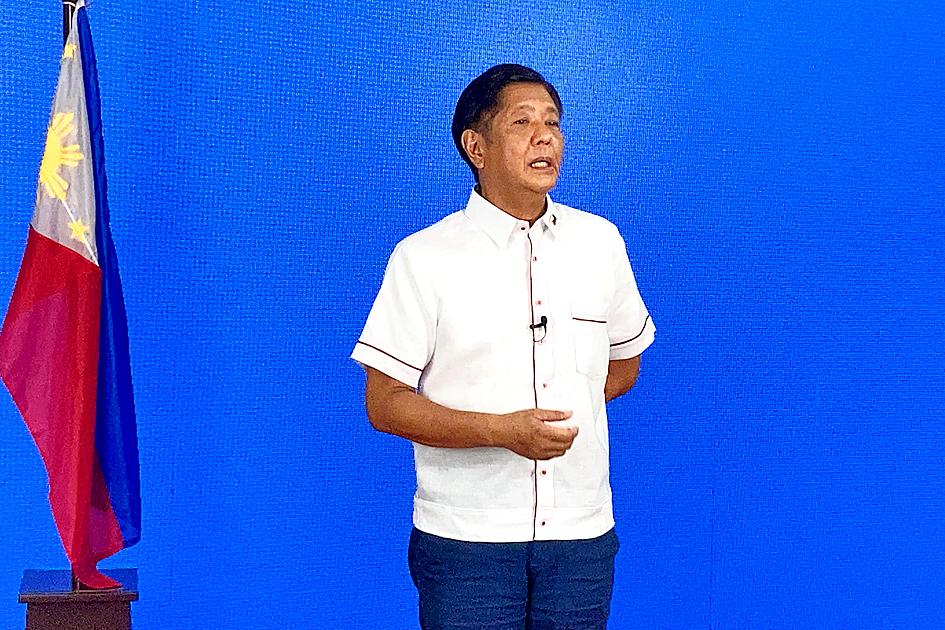Foreign investors are on wait-and-see after elections in the Philippines won by Ferdinand Marcos Jr and a rally in the equities market might be a challenge, Philippine Stock Exchange President Ramon Monzon said yesterday.
“Further upside? It’s going to be tough. We have a lot of macroeconomic problems,” Monzon said in an interview with Bloomberg TV.
“The new economic team has a lot of hard work in front of them,” he said, citing the nation’s record debt and the need for new revenue sources.

Photo: AFP
The benchmark Philippine stock index fell by as much as 3.1 percent to a nine-month low a day after the elections on Monday.
Most of the 30 components of the benchmark dropped, with AC Energy Corp, San Miguel Corp, Wilcon Depot Inc and Robinsons Land Corp leading the losses.
Foreigners were net sellers in the local stock market a week before the vote.
The slide in the benchmark gauge also reflects losses in regional shares as rising US interest rates and slowing Chinese growth hurt sentiment.
The Philippine Stock Exchange Index has fallen more than 6 percent this year, outperforming the MSCI AC Asia Pacific Index, which dropped almost 18 percent.
“Many investors are likely to be in a wait-and-see mode,” Robert Ramos, who helps manage 140 billion pesos (US$2.7 billion) as head of the trust and investments group at Rizal Commercial Banking Corp, said before the start of trading. “They will wait for the new government to discuss its plan for the economy and how we get out from the impact of the [COVID-19] pandemic.”
Investors are awaiting who presumptive president Ferdinand Marcos will appoint in his economic team.
“I think that’s the most important thing in a change of administration,” Monzon said.
Marcos’ majority vote is being viewed “very positively” by some people, he said.
Economic reforms under Philippine President Rodrigo Duterte, which include further opening the economy to foreign investors and the revised rules in the capital market, are positive points.
“The ingredients are there. It’s just a question of really hoping the new team will have this dynamism that the country needs,” Monzon said.

KEEPING UP: The acquisition of a cleanroom in Taiwan would enable Micron to increase production in a market where demand continues to outpace supply, a Micron official said Micron Technology Inc has signed a letter of intent to buy a fabrication site in Taiwan from Powerchip Semiconductor Manufacturing Corp (力積電) for US$1.8 billion to expand its production of memory chips. Micron would take control of the P5 site in Miaoli County’s Tongluo Township (銅鑼) and plans to ramp up DRAM production in phases after the transaction closes in the second quarter, the company said in a statement on Saturday. The acquisition includes an existing 12 inch fab cleanroom of 27,871m2 and would further position Micron to address growing global demand for memory solutions, the company said. Micron expects the transaction to

Vincent Wei led fellow Singaporean farmers around an empty Malaysian plot, laying out plans for a greenhouse and rows of leafy vegetables. What he pitched was not just space for crops, but a lifeline for growers struggling to make ends meet in a city-state with high prices and little vacant land. The future agriculture hub is part of a joint special economic zone launched last year by the two neighbors, expected to cost US$123 million and produce 10,000 tonnes of fresh produce annually. It is attracting Singaporean farmers with promises of cheaper land, labor and energy just over the border.

US actor Matthew McConaughey has filed recordings of his image and voice with US patent authorities to protect them from unauthorized usage by artificial intelligence (AI) platforms, a representative said earlier this week. Several video clips and audio recordings were registered by the commercial arm of the Just Keep Livin’ Foundation, a non-profit created by the Oscar-winning actor and his wife, Camila, according to the US Patent and Trademark Office database. Many artists are increasingly concerned about the uncontrolled use of their image via generative AI since the rollout of ChatGPT and other AI-powered tools. Several US states have adopted

A proposed billionaires’ tax in California has ignited a political uproar in Silicon Valley, with tech titans threatening to leave the state while California Governor Gavin Newsom of the Democratic Party maneuvers to defeat a levy that he fears would lead to an exodus of wealth. A technology mecca, California has more billionaires than any other US state — a few hundred, by some estimates. About half its personal income tax revenue, a financial backbone in the nearly US$350 billion budget, comes from the top 1 percent of earners. A large healthcare union is attempting to place a proposal before